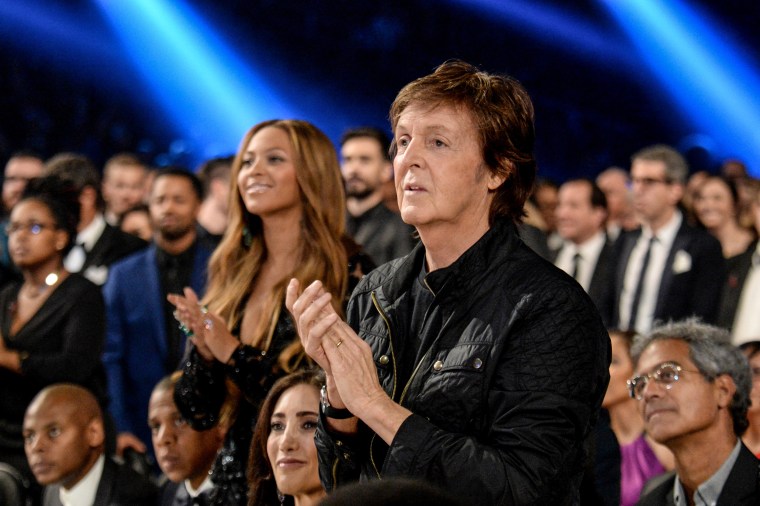Paul McCartney has weighed in on Beyoncé’s cover of “Blackbird,” which comes near the beginning of her latest album “Cowboy Carter.”
“I am so happy with @beyonce’s version of my song ‘Blackbird’” McCartney wrote on Twitter. “I think she does a magnificent version of it and it reinforces the civil rights message that inspired me to write the song in the first place. I think Beyoncé has done a fab version and would urge anyone who has not heard it yet to check it out. You are going to love it!”
He continues by explaining that they connected after he had given his blessing for her to record a rendition of the song.
“I spoke to her on FaceTime and she thanked me for writing it and letting her do it,” he continued. “I told her the pleasure was all mine and I thought she had done a killer version of the song. When I saw the footage on the television in the early 60s of the black girls being turned away from school, I found it shocking and I can’t believe that still in these days there are places where this kind of thing is happening right now. Anything my song and Beyoncé’s fabulous version can do to ease racial tension would be a great thing and makes me very proud.”
McCartney does not mention in his post that she used the master recording of the original guitar-and-foot-tapping backing part he recorded for the Beatles’ White Album in 1968 as the backing track for her new version, as reported earlier this week in Variety. He also receives a co-producing credit on her new recording.
Beyoncé’s lyrically and musically faithful version of the 1968 tune adds additional harmony and/or lead vocals from four Black country singers — Reyna Roberts, Tanner Adell, Brittney Spencer and Tiera Kennedy — along with some fresh bass and orchestration, over McCartney’s original solo acoustic track.This is not the only cover on Beyoncé’s new album; “Cowboy Carter” also includes a new version of Dolly Parton’s “Jolene” (with an updated rewrite of the country star’s lyrics and song structure).
Some online and in the industry blasted “Cowboy Carter,” including singer Lilly Allen, who said she is recording a country album of her own. On her BBC Sounds podcast “Miss Me?,” she called Beyoncé’s crossover project “quite calculated.” She added, “I’m here because I love country music and always have done, not saying Beyoncé doesn’t, but I tell stories in my music and that’s what country music is.”
TikTok user Sam Doll went viral this week for saying “Cowboy Carter” was a disjointed album and that the covers, including “Jolene,” were “boring” and “abysmal.” The video was deleted after a wave of backlash.
“Blackbird” was first heard on the self-titled album from the Beatles also known as the White Album. Penned by McCartney (credited as Lennon-McCartney), the song’s inspirations were long variously credited to the sounds of blackbirds in Rishikesh, India (where the Beatles stayed studying Transcendental Meditation), ailing family members or the civil rights movement in America in the ’60The singer-songwriter solidified the origins of the song’s inspiration in an interview with GQ.
“I was sitting around with my acoustic guitar, and I’d heard about the Civil Rights troubles that were happening in the ’60s in Alabama, Mississippi, Little Rock in particular,” McCartney said.
“So that was in my mind, and I just thought, ‘It would be really good if I could write something that if it ever reached any of the people going through those problems, it might give them a little bit of hope. So I wrote ‘Blackbird.’ In England, a bird is a girl, so I was thinking of a Black girl going through this; now is your time to arise; set yourself free; take these broken wings.”
“One of the nice things about music is that you know that a lot of people listening to you are going to take seriously what you’re saying in the song. I’m very proud of the fact that The Beatles’ output is always really, pretty positive.”
Earlier this week, Melba Pattillo Beals told the Washington Post that hearing Beyoncé’s cover transported her back to her youth. Beals was a member of the Little Rock Nine, a group of Black students in Arkansas who integrated the all-white Central High School.
She said she loved the original song as soon as she heard it in 1968, decades before learning that she and her classmates were its inspiration.
“Paul McCartney said by writing that song, ‘I hear you. I may not be able to rescue you, but I hear you singing in your dark,’” she told The Post.
For more from NBC BLK, sign up for our weekly newsletter.

